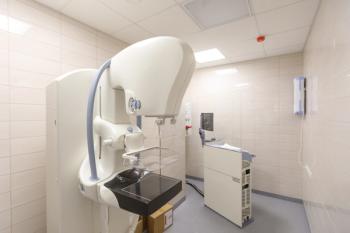
Parsaclisib has been granted a priority review for 3 indications that include relapsed or refractory follicular, marginal zone, and mantle cell lymphoma.

Parsaclisib has been granted a priority review for 3 indications that include relapsed or refractory follicular, marginal zone, and mantle cell lymphoma.

“It is not a ‘one and done kind of thing.” It is very important to implement these skills throughout the community. It's a practice. It's a behavioral change.”

An expert from Dana-Farber Cancer Institute comments on ongoing research in translocation RCC and next steps for research in this treatment space.

Ruxolitinib and belumosudil represent FDA-approved treatment options to manage cGVHD, however, real world data will determine best practices for treatment and future research directions within the space.

The FDA have granted an accelerated approval to acimibinib, which treats CML by binding to the ABL myristoyl pocket.

The director at the Center for Cancer Health Equity, The University of Ohio Comprehensive Cancer Center, discusses improving preventative screenings in underprivileged communities.

Becoming a nurse entrepreneur can be a surprisingly easy and sometimes affordable option that most nurses never consider.

The small molecule oral immunomodulator EC-18 reduced the duration and incidence of severe oral mucositis in patients with head and neck cancer undergoing concurrent chemoradiation.

Antoinette Wozniak, MD, FACP, FASCO, outlines the importance of careful patient monitoring in lung cancer and emerging therapy options expected to change the treatment landscape.

Stephanie Jackson, DNP, MSN, RN, AOCNS, BMTCN, Oncology Nursing News co-editor in chief, comments on the importance of self-care for oncology nurses.

A greater percentage of children with cancer experienced severe illness and mortality after becoming infected with COVID-19 compared with children in the general pediatric population.

The implementation of the Oncology Nursing Society’s new Get Up, Get Moving Program helped patients increase their daily step intake and maintain their health-related quality of life.

Health care professionals who treated patients throughout the COVID-19 pandemic and received CBD therapy reported less burnout and emotional exhaustion than those solely receiving standard-of-care treatment.

This holistic approach will allow you to discover your unique blueprint for well-being in life rather than focusing solely on amassing wealth.

Approximately 73% of patients with NMIBC who experienced a complete response after non-surgical primary chemoablation using mitomycin-containing reverse thermal gel UGN-102 remained disease free at 9 months.

The recently launched phase 2 ACE-Breast03 seeks to appraise the efficacy and safety of the novel antibody-drug conjugate, ARX788, in patients with metastatic HER2-positive breast cancer whose disease is resistant to previous targeted therapies.

A recent study identified some of the key challenges in coordinated care for underinsured and uninsured cancer survivors who have initiated the surveillance stage of their journey.

Rather than encouraging patients to acknowledge their sickness, it’s more valuable to have them recognize their wellness.

Inguinofemoral radiotherapy may be a safe alternative for patients with vulvar cancer and sentinel node micrometastases who might otherwise face the morbidity of a lymphadenectomy.

Stephanie Jackson, DNP, MSN, RN, AOCNS, BMTCN, Oncology Nursing News co-editor in chief, comments on how health care providers can effectively care for patients with COVID-19 and hematologic malignancies.

A speaker at the Oncology Nursing Society Bridge Program discussed how nurses can build their own resilience and proactively protect their mental well-being.

Sintilimab, a bevacizumab biosimilar injection, met the primary end point of the phase 3 ORIENT-31 trial by significantly increasing progression-free survival in patients with EGFR-mutated, nonsquamous, non–small cell lung cancer.

As health care providers and essential workers, we remain the most trusted profession. We, therefore, have a responsibility to our patients to be examples that influence vaccination decisions.

Patient Reported Outcomes Measurement Information System scoring suggested that wound complication was associated with more severe anxiety and decreased physical function in patients receiving radiation therapy for soft tissue sarcoma.

Health care professionals and nurses play an important role in providing health information to patients and their families.

A real-world survival analysis showed that patients with metastatic RCC treated with axitinib plus pembrolizumab did not experience significantly improved survival outcomes compared with patients treated with ipilimumab plus nivolumab.

After a Type A meeting with the FDA regarding oral paclitaxel/encequidar in metastatic breast cancer, Athenex, Inc. has announced that they will be deploying their resources to other avenues of research.

Atezolizumab is the first immunotherapy approved in the adjuvant setting to treat NSCLC.

“Previously, this mutation has been undruggable, but this is now changing.”

The Oncology Nurse Practitioner Fellowship at Sylvester Comprehensive Cancer Center exposes fellows to the gamut of oncology care and teaches the skills they need to succeed.